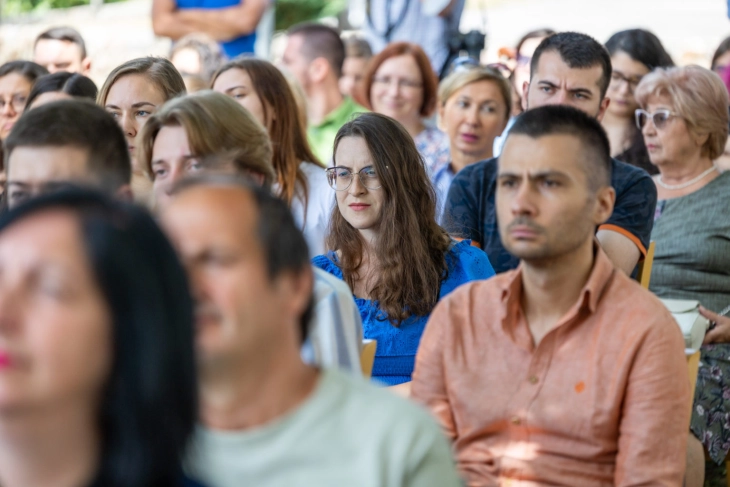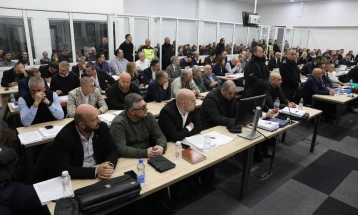Macedonian language scholars: Bulgarian claims are nonsense

Ohrid, 30 August 2022 (MIA) – Over 300 undergrads, post-grads and PhD students of Macedonian language studies are learning the Macedonian language and culture in 20 centers of the world, and they are the greatest ambassadors for its promotion.
Some of them were in Ohrid recently, perfecting their knowledge and skills at the 55th Summer School of the International Seminar for Macedonian Language, Literature and Culture, organized by the Ss. Cyril and Methodius University in Skopje.
Macedonian language scholars – greatest ambassadors for the promotion of the Macedonian language
According to the director of the International Seminar, professor Vesna Mojsova-Chepishevska, the study of the Macedonian language in 10 universities and as many lectorates throughout the world, as well as the great number of students and lecturers, attests to the increased interest in Macedonian studies.
“The 55th Summer School proves our continued work and spreading of Macedonian studies throughout the world, and that the participants will continue to spread it to their own countries with the knowledge they garner here, hence why we say that seminarists are the greatest ambassadors,” the professor says.
Nikola Jankulovski, Rector of the Ss. Cyril and Methodius University in Skopje, believes that the 60 participants from 17 countries throughout the world is a sign that interest in the summer school, as well as the Macedonian language, literature and culture, is increasing. Alongside students from countries that teach Macedonian studies, such as France, Hungary, Poland and the Czech Republic, there are students from countries that could become university centers teaching the Macedonian language, literature and culture in the future, such as Austria, Germany and Italy. The presence of students from the US and South Korea shows that “interest is returning in learning the Macedonian language in these countries as well”.
“This Summer School, as one of the International Seminar’s many activities, is of exceptional importance not just for the Macedonian language, literature and culture, but for our country as a whole, because this school creates our biggest supporters and cultural ambassadors worldwide – Macedonian scholars from abroad. We follow in Koneski’s footsteps proudly. The stronger the attacks, the prouder we stand as an institution of higher education and science, which nurtures the Macedonian language, literature and culture, educating professional personnel in Macedonian,” Jankulovski pointed out.
No education without textbooks
Macedonian scholars abroad, as well as those who wish to study Macedonian on multiple levels, can do so in the future with the new editions of textbooks in Macedonian for foreigners, existing in .pdf and audiobook formats at the UKIM Summer School website. This will allow foreign Macedonian and Slavic scholars to not only read Macedonian, but to also hear it in order to perfect it.
This year’s participants have the opportunity to learn from the three new textbooks that were printed recently, following the ones from 2019, “Teshkoto” for beginners, “Lozje” for intermediate and “Vezilka” for advanced education, i.e. a book of Macedonian literature and culture.

“These textbooks follow the trend of the new, the aesthetic, the beautiful and the eye-catching, while simultaneously existing as .pdf files and audiobooks so that they can be listened to on UKIM’s website in the International Seminar section, which also has older textbooks for studying Macedonian as a second language,” said Mojsova-Chepishevska, emphasizing that it also has Blazhe Koneski’s grammar, without which learning is impossible.
Textbooks are “vital to education”, a similar idea to the one Jordan Hadzi Konstantinov – Dzinot had.
“There can be no education without textbooks, they’re a staple. Jordan Hadzi Konstantinov – Dzinot had this idea. His Tablica Pervaja, the first alphabet book, showed his sense as a teacher that these children need books to learn from. There have always been textbooks in Macedonian and there always will be,” said Summer School director/author of Vezilka.
Professor Gordana Aleksova, author of Lozje, explained that the textbook was prepared according to the standards of the common European framework for languages, according to which, the study of a foreign language is carried out mainly on three levels: beginner, intermediate and advanced.
- The textbook Lozje came out of the press with its second and supplemented edition, and the users got to see it for the first time at the 55th Summer School. This textbook has been prepared in accordance with the standards of the common European framework for languages and meets the needs of the B1 and B2 levels. It is also used in the work of Macedonian language lectureships abroad and Macedonian language centers at various universities around the world,” said Aleksova.
Bulgaria's claims that the Macedonian language is a dialect of Bulgarian are meaningless
The Macedonian scholars and participants in the seminar believe that the denial of the Macedonian language by Bulgaria and the claims that it is a dialect of Bulgarian is meaningless and political.
“The non-recognition of the Macedonian language by Bulgaria and the claim that it is a dialect of Bulgarian is nonsense for me. The Macedonian language was codified in 1945 and since then it has been officially treated as a separate language and there is nothing to dispute,” says Ana Marija Cinega-Panzova, a translator from Hungarian to Macedonian and vice versa.
She says that through translations she helps in the transmission of cultural values. Last year, in honor of the 100th anniversary of the birth of Blazhe Koneski, she translated a collection of texts for greater affirmation of the Macedonian language.
“In those articles, Blazhe Koneski very clearly and expertly explains all the differences that the whole dispute is nonsensical. The translation of the collection was my contribution to the Macedonian language last year,” says Cinega-Panzova.
The professor of Croatian, Serbian and Macedonian language and literature and teacher of Slovenian for the Macedonian diaspora Sonja Douzhan from Slovenia also expressed revolt against the Bulgarian claims.
“I consider Bulgaria's claims as very underhanded. How can someone else from outside come and say that people here speak some other language. If the Macedonians say that they speak Macedonian, why should the Bulgarians say that it is not Macedonian? I absolutely support the Macedonians. I also know the Bulgarian language and I can claim personally that it is absolutely not the same language. It differs a lot both grammatically and lexically, I don't know where you got the idea that it could be the same language. Bulgaria's claims are based only on politics,” Douzhan pointed out.
For the director of the school, the claims of the Bulgarians mean nothing.
“I am Macedonian, I know where my language came from and I know that it was spoken centuries ago and that it had its own literature and a certain culture that developed even in the 19th century,” underlined Mojsova-Chepishevska.
All languages derive from an earlier one, ours came from Proto-Slavic
All languages, as Professor Mojsova-Chepishevska says, derive from some other previous language.
“All of our Slavic languages have come from Proto-Slavic. It’s not Old Bulgarian, he is not even Old Macedonian. It is based on today's South Macedonian languages, which are found in the Aegean part, that is, northern Greece, and that is a fact and no one disputes it. It is pointless for someone to tell me that my language came from or is a dialect of Bulgarian. I don't perceive it at all, because I know what the difference is. Some of the foreign Macedonians also study the Bulgarian language and they mostly understand the difference,” points out Mojsova-Chepishevska.
She believes that we should not enter into unnecessary disputes, because they create more passion, ferocity and nervousness, and not much is achieved.
“We all have to contribute where we are strongest. One cannot say that Macedonian literature does not exist, just as one cannot say that Macedonian literature can be easily read by Bulgarians and conversely that Macedonians can easily read Bulgarian literature. Maybe the languages were closer in the 19th century, but now in the 21st century this is not the case. Why do we need translators, so that we can truly understand each other and not get lost in translation?” says the professor and director of the Summer School.
National strategy for the preservation of the Macedonian language
To preserve the Macedonian language, it is necessary to make a national strategy, according to the director of the Summer School of the International Seminar, Vesna Mojsova-Chepishevska. According to her, the opening of a lectureship in Tirana should be part of that strategy. She reminded that they are working on opening a lectureship in Ankara, where there is already a Macedonian language department, and they are also working on opening a Macedonian language lectureship in Beijing at one of the largest universities in Asia for studying minor foreign languages. The interest in learning the Macedonian language has increased in Greece as well, from where the Summer School has two participants of Macedonian origin and a Greek woman from Athens, who wants to do ethnological research in Macedonia, for which she needs to get to know the language more.
Next year, the Macedonian Language Lectorate in France will celebrate its 50th anniversary, and the year after that, the Lectorate in Bucharest will also celebrate half a century of its existence.
“They all do a lot. Anameta Sobijotu celebrated 60 years of Macedonian studies in Ljubljana and she spoke about the overall tradition of Macedonian studies for 60 years at the University of Ljubljana. Although it started in the time of former Yugoslavia, it did not stop when we separated and now it is part of a country that is a member of the European Union, adds Mojsova-Chepishevska.
Slagjana Stojkova Kostoski
Translated by Dragana Knezhevikj







